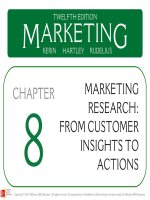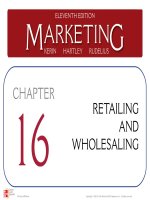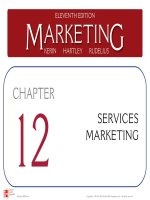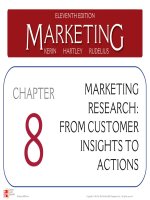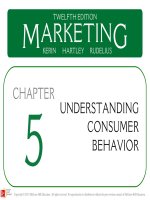Lecture Marketing (12/e): Chapter 12 – Kerin, Hartley, Rudelius
Bạn đang xem bản rút gọn của tài liệu. Xem và tải ngay bản đầy đủ của tài liệu tại đây (1.88 MB, 26 trang )
Copyright © 2015 McGrawHill Education. All rights reserved. No reproduction or distribution without the prior written consent of McGrawHill Education.
LEARNING OBJECTIVES (LO)
AFTER READING CHAPTER 12, YOU SHOULD BE ABLE TO:
LO 12-1
Describe four unique elements of
services.
LO 12-2
Recognize how services differ and how
they can be classified.
LO 12-3
Explain how consumers purchase and
evaluate services.
LO 12-4
Develop a customer contact audit to
identify service advantages.
122
LEARNING OBJECTIVES (LO)
AFTER READING CHAPTER 12, YOU SHOULD BE ABLE TO:
LO 12-5
Explain the role of the seven Ps in the
services marketing mix.
LO 12-6
Discuss the important roles of internal
marketing and customer experience
management in service organizations.
123
NEW SERVICES CAN HELP YOU BECOME
PART OF THE SHARING ECONOMY
124
FIGURE 12-1 Services are a larger part of the
U.S. GDP than goods
125
LO 12-1
THE UNIQUENESS OF SERVICES
THE FOUR I’S OF SERVICES
Services
Four I’s of Services
• Intangibility
• Inconsistency
126
LO 12-1
THE UNIQUENESS OF SERVICES
THE FOUR I’S OF SERVICES
Four I’s of Services
• Inseparability
Self-Service Technologies
• Inventory
Idle Production Capacity
127
FIGURE 12-2 Inventory carrying costs of
services depend on the cost of employees and
equipment
128
LO 12-2
THE UNIQUENESS OF SERVICES
THE CONTINUUM AND CLASSIFICATION OF SERVICES
Service Continuum
Classifying Services
• Delivery by People or Equipment
• For-Profit or Nonprofit Organizations
• Government Sponsored
129
FIGURE 12-3 The service continuum shows
how offerings can vary in their balance of
products and services
1210
FIGURE 12-4 Services can be classified as
equipment-based or people-based
1211
LO 12-2
MARKETING MATTERS
Social Marketing is a Must for Nonprofits
1212
LO 12-3
HOW CONSUMERS PURCHASE SERVICES
THE PURCHASE PROCESS
Search Properties
Experience Properties
Credence Properties
1213
FIGURE 12-5 Consumers use search,
experience, and credence properties to
evaluate services
1214
LO 12-3
HOW CONSUMERS PURCHASE SERVICES
ASSESSING SERVICE QUALITY
Gap Analysis
Dimensions of Service Quality
Service Failures
1215
FIGURE 12-6 The five dimensions of service
quality
1216
LO 12-3
MARKETING INSITE
How Can You Learn about Service Failures?
Media Monitoring!
Google Blogs
Technorati
ReputationDefender
1217
LO 12-4
HOW CONSUMERS PURCHASE SERVICES
CUSTOMER CONTACT AND RELATIONSHIP MARKETING
Service Encounters
Customer Contact Audit
• Service Blueprint
A Customer’s Car Rental Activities
Relationship Marketing
1218
FIGURE 12-7 Customer contact audit for a car
rental agency (green boxes = customer
activity; orange boxes = employee activity)
1219
LO 12-5
MANAGING THE MARKETING OF SERVICES
THE SEVEN Ps OF SERVICES
Seven Ps of Services Marketing
Product (Service)
• Branding
Price
• Off-Peak Pricing
1220
LO 12-5
MANAGING THE MARKETING OF SERVICES
THE SEVEN Ps OF SERVICES
Place (Distribution)
Promotion
• Publicity
• Public Service Announcement (PSA)
1221
LO 12-5
MANAGING THE MARKETING OF SERVICES
THE SEVEN Ps OF SERVICES
People
• Internal Marketing
• Customer Experience Management (CEM)
Physical Environment
Process
• Capacity Management
1222
FIGURE 12-8 Different prices and packages
help match demand to capacity
1223
LO 12-5
USING MARKETING DASHBOARDS
Are JetBlue’s Flights Profitably Loaded?
Airline Operating Income (Loss) per Available Seat Flown One Mile (ASM)
Operating Income (Loss) = Yield × Load Factor – Operating Expenses
per Flown ASM
1224
LO 12-6
SERVICES IN THE FUTURE
Technological Advances
• Mobility
• Personalization
• Convergence
• Sustainability
1225



